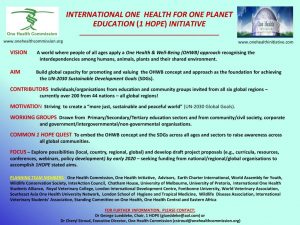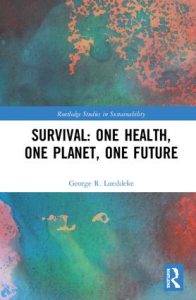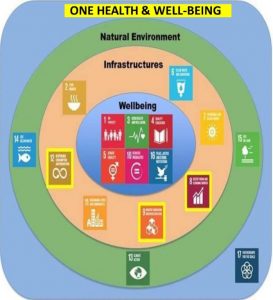Ways forward to ensure the sustainability of people and the planet are needed at a time when the interdependencies among humans, animals, plants and the environment are to be recognized as the cornerstone to drive/steer the UN 2030 Sustainable Development Goals (SDGs). In this connection, PEAH had the pleasure to interview Dr George Lueddeke as the author of the recently published cross-disciplinary book Survival: One Health, One Planet, One Future Routledge, 1st edition, 2019. Including contributions from the World Bank, InterAction Council, Chatham House, UNESCO, World Economic Forum, the Tripartite One Health collaboration (UN Food and Agriculture Organization, World Organisation for Animal Health and World Health Organization), One Health Commission and more - this book cuts across sociopolitical, economic and environmental lines
By Daniele Dionisio
PEAH – Policies for Equitable Access to Health
INTERVIEW
Chair, One Health Education Task Force
Chair, international One Health for One Planet Education Initiative (1 HOPE)
One Health Commission and One Health Initiative
Consultant in Higher and Medical Education, Southampton, UK
George R. Lueddeke MEd PhD Dipl.AVES (Hon.) is an educational advisor in higher and medical education and chairs the global One Health Education Task Force for the One Health Commission and the One Health Initiative as well as the international One Health for One Planet Education Initiative (1 HOPE). He has published widely on educational transformation, innovation and leadership and been invited as a plenary speaker to different corners of the world. Bio
– PEAH: Dr. Lueddeke, the international One Health for One Planet Education (1 HOPE) initiative was created to address perhaps the most important social problem of our time:‘How to change the way humans relate to the planet and each other to ensure a more sustainable future to all life’.
On this wavelength, what about the main purpose of Survival: One Health, One Planet, One Future?
Table of contents here
– Lueddeke: The book tries to make sense of the uncertain and tense (“rattling”) times we are experiencing and asserts that the One Health & Well-Being concept (OHWB) – that recognises the interdependencies among humans, animals, plants and their shared environment – is critical to safeguarding our future while also providing a “unity around a common purpose” that seems to be missing globally. I prefer the term One Health & Well-Being (vs just ‘One Health’) as it emphasises not only the crucial importance of human physical and mental well-being but also the need to strive toward meeting socioeconomic, geopolitical and ecological conditions to ensure the sustainability of all living species and the planet.
I also argue that the OHWB approach ought to drive/steer the 17 UN-2030 Sustainable Development Goals (SDGs) that were agreed by all 193 Member States of the United Nations in September 2015. The main aim of the UN Global Goals is to create ‘a more just, sustainable and peaceful world.’ The OHWB perspective needs to inform and encourage decision-makers at all levels – especially Civil Society- to get behind the UN global initiative regardless of ideological persuasion or divisions. The challenge is how to get government, business and civil society behind OHWB and the SDGs across all nations – those that are more economically developed and those that are developing and of course those that are in disarray – many for reasons that defy logic. Concentrating on local needs guided by global/national priorities that are in keeping with sustainability values and practices is without a doubt the best way forward.
There are about 7.7 billion people on the planet, and it is estimated that there will be over 9.8 billion by 2050 and 11.2 billion in 2100. Climate change, urbanisation, pandemics, conflicts (globally we spend over US $7 trillion on war and only $ 3% on peace-c. $6 billion! ) and food security are main issues we need to tackle now and feature in the book along with health care – perhaps prompting reconsideration of the term “Public Health” and widening its remit to the more inclusive “Global Health and Well-Being” as the focus must shift to ecocentrism.
Changing the way we think and behave should no longer be a question of why but how -although our main concerns continue to be political and economic rather than sustaining the planet. Populism, nationalism and isolationism are the antithesis of the paths toward which we ought to be striving. The root causes of these movements need to be investigated and solutions found that ensure global equity, peace and sustainability. It may be important to remind global decision-makers that if we fail to save the planet none of the other human activities will matter. Shelley’s poem Ozymandias (1818) comes to mind. I am also reminded of a quote by economist and author John Kenneth Galbraith – ‘A nuclear war does not defend a country and it does not defend a system …not even the most accomplished ideologue will be able to tell the difference between the ashes of capitalism and the ashes of communism.’
– PEAH: The book highlights two of our greatest social problems: changing the way we relate to the planet and to one another and confronting how we use technology for the benefit of both humankind and the planet. How to translate theory into practice?
– Lueddeke: Several years ago, Marco Lambertini, executive director at WWF, made clear why there has to be a major societal transformation. As one example, he observed that ‘in less than two human generations, population sizes of vertebrate species have dropped by half.’ Further, he reminded us: ‘These are the living forms that constitute the fabric of the ecosystems which sustain life on earth and the barometer of what we are doing to our planet, our only home.’ He also warned that ‘We ignore their decline at our peril.’ Echoing the book’s main theme, he also emphasised the need for ‘unity around a common cause,’ collaboration, and leadership ‘to start thinking globally and to stop behaving as if we have a limitless world.’
In the intervening five years since the WWF report was published, too few leaders – G7 (France, United States, United Kingdom, Germany, Japan, Italy, Canada [ Russia suspended] and E7 (emerging – China, India, Brazil, Mexico, Russia, Indonesia and Turkey) have listened. Given the available evidence today (e.g., the UN biodiversity report published in May 2019!), there is now, unquestionably, a pressing need to re-orient society towards a sustainable future. The challenge is to shift our perspective from two-dimensional to three-dimensional, ‘orbital’ thinking, as NASA International Space Station astronaut Col Ron Garan contends – ‘bringing to the forefront the long-term and global effects of every decision.’
– PEAH: Relevantly, you maintain in the book that two fundamental changes are necessary if we – and all other species – are to survive in the coming decades. Tell us more, please, around these changes.
– Lueddeke: In terms of sustainability we are challenged to make a fundamental mindshift – adopt a new worldview – to ensure our needs as human beings are compatible with the needs of our outer world – our ecosystem. Education is key in this regard as are global/national/local policies and strategies that underpin OHWB and the SDGs.
Secondly, we must ensure that technology / AI is used only for peaceful purposes and in support of the health and well-being of all species and the planet. The dangers of techno warfare and genetically engineered viruses are all too real and we must learn from history. The late physicist, Stephen Hawking, said it best ‘We are all different we all share the human spirit’ but ‘unless crucial societal transformations occur, including the prevention of nuclear war, global warming and genetically engineered viruses – the shelf life of Homo sapiens could be extremely short.’
The battle between technology and humanity may yet become our greatest threat. As we head further into a techno-driven society – age of quantum computers (where computations can be done in minutes vs 10,000 years on today’s supercomputers), there is a real danger that we become increasingly dehumanised rather than as Klaus Schwab, executive chair of the World Economic Forum, aspired, that we refocus on becoming ‘better humans.’
– PEAH: Summarised in *Ten Propositions for Global Sustainability*(Ch. 12), the volume calls for the One Health and Well-Being concept to become the cornerstone of our educational systems and societal institutions – helping to create – in keeping with the UN 2030 Global Goals – a more “just, sustainable and peaceful world.” Can you detail about the Propositions in their connection with the One Health and Well-Being concept?
– Lueddeke: Two of the main recommendations of Survival is that the One Health & Well-Being concept should become the cornerstone of our educational systems and society at large and that OHWB principles and approach should underpin the UN-2030 Sustainable Development Goals.
The Propositions cut across socioeconomic, geopolitical and environmental lines. The need for a paradigm shift and peaceful use of technology have already been mentioned. Others relate to migration, genuine collaboration among government, business, civil society, and actively promoting ‘the values of equality, democracy, tolerance and respect.’ The need for global discussion on these and other propositions seems essential. The UN could be best placed to lead on the initiative perhaps supported by higher education institutions (universities, colleges, etc) of which there are about 26,000 impacting on the lives of millions.
To raise awareness across education systems and communities, the One Health Education Task Force along with a global planning team are evolving an international One Health for One Planet Education Initiative (1 HOPE). Anyone interested in joining a working group can sign up https://tinyurl.com/y2ux5b5g
– PEAH: Proposition 10, inter alia, focuses on reforming the UN Security Council established right after WWII (1946).What does this mean?
– Lueddeke: Well, the UNSC was formed after WWII (1946) consisting of 5 permanent members (US, China, Russia, UK, France), while in 2019, the most densely populated regions with the greatest poverty and conflicts – Africa (c. 1.2 bill), India (c.1.3 bill), SE Asia (c. 600 mill), Middle East (c. 400 mill) – c. 50 % [3.5 bill out of c 7.7 bill] – are NOT permanently represented. Shifting to regional (6) representation (vs countries) would clearly be in the best interest of the world given the need for global accountability and sustainability.
UNSC members should also be held globally accountable by key stakeholders – governmnet, business, civil society – for their role in maintaining world peace and security – based on a genuine commitment to shared people and planet values. The question is how can we achieve these ends when forces are pushing the world in the opposite direction. Surely, these decision-makers also have children and grand-children and would like to see them thrive in a better world where hopes and dreams can be realised.
– PEAH: As for the range of key topics covered in the book?
– Lueddeke: This is my third book this decade and in a way represents a personal journey of discovery trying to understand the world and healthcare – first from a more narrow human-centric medical education perspective (Medical Education for the 21st Century), moving to the wider public health horizon and recognizing the limitations of my assumptions (Global Population Health &Well-Being in the 21st Century) to pulling various strands together in Survival: One Health, One Planet, One Future. I don’t think I could have written the latter without the former. The new publication is really a building block of personal knowledge acquisition tinged by personal and professional experience in Canada and the UK plus other countries.
– PEAH: As reported ‘…The sub-discipline that has perhaps come closest to integrating other disciplines, including medicine and environmental science, is public health. In Survival: One Health, One Planet, One Future, George R. Lueddeke, the chair of the One Health Education Task Force, shows how public health can be incorporated into a wide range of fields to address individual, population, and ecosystem health…’With respect to this, kindly let us know more.
– Lueddeke: This quote appears in one of the on-line book reviews and comes from a World Economic Forum / Political Syndicate on-line article, “Economics can no longer ignore the earth’s natural boundaries,” written by Erik Berglof at the London School of Economics. Three key messages are that 1) economists have treated inequality too narrowly and that income disparities within countries are caused mainly by global financial forces rather than local labor-market conditions; 2) policies are required to make society more sustainable; and 3) a new field of planetary social science is needed to bring together ‘different perspectives, conceptual frameworks, and analytical tools.’ He affirms that public health is closest to integrating other disciplines and refers to Survival: One Health, One Planet, One Future, and ‘how public health can be incorporated into a wide range of fields to address individual, population, and ecosystem health.’
Survival concludes with a discussion on the leadership role that Generation Z – those – the ‘fixers’ born in the mid 90s – need to play in the decades that lie ahead . They are becoming the face of the planet and are much more tolerant of others and thrive on collaboration. Recalling the eloquent words of civil rights leader Martin Luther King Jr, Gen Z are certainly far from silent ‘about things that matter.’ Their voices must be heard across the globe as their future depends on decisions we make today!
– PEAH: Your insightful answers best enhance the book. So compounded, the volume is of great interest to policy-makers, multi-professional practitioners, academics, students across all disciplines and concerned members of the general public – especially the younger generation – in both developed and developing nations. For many reviewers to date, your book is indeed a wake-up call which needs to be heard “loud and clear” globally.
Reviews here
Just echoing a recent endorsement by Tracy Collins, founder at The Island Retreat, County Cork, Ireland ‘… When we accept that humankind is part of something bigger, then the world will be a better place. Our natural world is not there to provide us with unlimited resources…it really is time to start learning to respect it. Thank you George R. Lueddeke for being a voice of reason in a world of chaos!’



